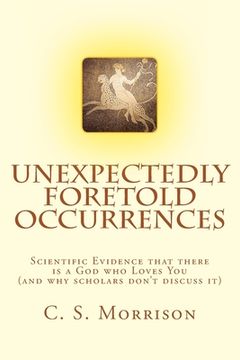Compartir
Unexpectedly Foretold Occurrences: Scientific Evidence that there is a God who Loves You (and why scholars don't discuss it) (en Inglés)
C. S. Morrison
(Autor)
·
Createspace Independent Publishing Platform
· Tapa Blanda
Unexpectedly Foretold Occurrences: Scientific Evidence that there is a God who Loves You (and why scholars don't discuss it) (en Inglés) - Morrison, C. S.
21,81 €
24,23 €
Ahorras: 2,42 €
Elige la lista en la que quieres agregar tu producto o crea una nueva lista
✓ Producto agregado correctamente a la lista de deseos.
Ir a Mis Listas
Origen: Estados Unidos
(Costos de importación incluídos en el precio)
Se enviará desde nuestra bodega entre el
Miércoles 31 de Julio y el
Miércoles 14 de Agosto.
Lo recibirás en cualquier lugar de España entre 1 y 5 días hábiles luego del envío.
Reseña del libro "Unexpectedly Foretold Occurrences: Scientific Evidence that there is a God who Loves You (and why scholars don't discuss it) (en Inglés)"
Does an honest critical analysis of the book of Daniel in the Bible reveal hard (scientific) evidence of the Christian God? This book claims it does, and mounts a surprisingly persuasive defence of this claim, uncovering astonishing features of Daniel that appear to be getting ignored because they support it. Critical scholars currently insist that none of the prophecies in the book of Daniel were intended to predict events beyond the 160s BC (the decade in which they believe the book was completed and made public). However, this theory has great difficulty explaining the content of three of those prophecies, Daniel 2, Daniel 7 and Daniel 9:24-27, crucial features of which are revealingly labelled 'obscure', or attributed to inexplicable ignorance and carelessness on the part of an otherwise well-informed writer. The explosive claim that this book makes is that there's a far simpler and much more plausible explanation for the content of these visions that critical scholars are ignoring: It is the possibility that they were included precisely because the intended readers in the 160s BC would interpret them as predictions of the distant future far beyond their day, making them less likely to believe skeptical claims that the book of Daniel was really a recent forgery (which would be largely based on the extent to which it predicted recent events). As this book shows, there are many grounds to think that those intended readers would and did interpret these passages as predictions of the future. And there is even robust evidence (largely ignored by scholars) that this was indeed the writer's intention. It's true that some of the events these passages predict resemble events in the 160s BC, but such resemblances are only what one would expect if the writer wanted to engage his readers' interest in these passages so that they would discover them to be predictions of the future - a discovery that would clearly discredit the skeptics. Since this hypothesis would perfectly explain why so many intelligent people (past and present) think these passages predicted the future well beyond their proposed time of writing, and isn't in any way inconsistent with evidence or rational principles, one rightly wonders why it never features in critical commentaries. This book blames the polarised nature of academic views on scripture. Conservative (religious) scholars don't want to appear critical of established doctrine, and critical scholars don't want to risk being labelled 'conservative'. But why does this matter? It matters because it obscures a profoundly astonishing fact. As this book makes clear, these real predictions are both specific and time-limited. Yet amazingly, history after the time of writing appears to have perfectly fulfilled their most likely meanings - the most justifiable way their intended readers could interpret them. This is especially strange because the predicted events are not of a sort that could be deliberately brought about by humans. And it is even more mysterious because the events that fulfilled each prediction include pivotal moments in the rise of Christianity. As well as asking the obvious question - Is this scientific evidence of the Christian God? - this book also deals with the issue of whether that God would really allow such evidence to be preserved in a forged document that was essentially propaganda if these arguments are correct. Many Christians will no doubt be firmly against this notion. However, if their God is real he clearly uses other imperfect vessels to carry his word. So why not the book of Daniel? This book points out that the datable nature and historical content of the parts of Daniel that it regards as forgeries make them vital to the function the book would be likely to have if it were the work of that God. They prove beyond reasonable doubt that Daniel 2, 7 and 9 were written as predictions of the distant future long before their astonishing and inexplicable fulfillment took plac
- 0% (0)
- 0% (0)
- 0% (0)
- 0% (0)
- 0% (0)
Todos los libros de nuestro catálogo son Originales.
El libro está escrito en Inglés.
La encuadernación de esta edición es Tapa Blanda.
✓ Producto agregado correctamente al carro, Ir a Pagar.

